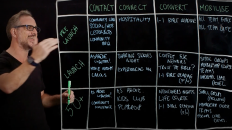Previous Posts
- Ideas from Cru
- Part 1: Overview of Process
- Part 2: Survey and Results
- Part 3: Promtoional Methods
- Part 4: Promotions and Incenties
- Part 5: Data Entry and Volunteer Support
A singificant factor in students 'sticking' with a Christian union is whether or not they establish good social connection. This is a massive challenge when you are dealing with hundred of new names at the start of every year and you are competing with all sorts of social activities and groups.
Part of our O Week Mission was to increase the amount of opportunity for social connection early on in the year. I think we did ok. But I think we could actually do more still.
Pizza Parties
We offered free pizza from Monday to Wednesday of O Week in the same venue where we hold our Thursday night Citywide Gatherings. This gave us a same-day place for new students we met to come and meet us.
We had not idea how successful these would be. In the end we had 56 people attend these events, of whom 20 were new contacts. So not great, but still ok. And of these 20 people, two of them were non-Christians who have since become Christians… so that's awesome!
Follow Up Coffees
It a massive feat to chase up all the almost 400 contacts and invite them one by one to meet for coffee. To contact them 3 times on both SMS and email was a huge feat, and then to arrange all these meetings was huge. We ended up meeting 70 people for coffee. And this was really worthwhile.
This kind of face to face, sharing stories, explaining things that were in brochures and emails and Facebook directly to somebody is great. Answering their questions and objections, helping them take a next step to church, to the FOCUS ministry or whatever.
Even then, however, lots of the people you end up meeting for coffee don't stick. So far about 15 cold contacts have joined small groups, 5 have attended evangelistic courses and 20 have attended public meetings. That's not including contacts made through youth group and school visits and members inviting friends along.
We have seen people trickle in and connect continually across the whole semester. In fact I met with another student just today who only just responded to an invitaton to meet for coffee.
Faculty Events
We had our faculty clusters organise social events to engage new people as well as bring together existing people. These have remained small so far: about 10-15 people per cluster. But even then, about 20 new people have come to at least one of these.
These are still not the size that we'd like. But they provide another contact point.
Public Events
We have worked at making sure food and socialising is a part of all our events. We have a simple breakfast at our 'Breakfast Session' monthly sermonn at 7:30am on Tuesday. We bought sushi and Subway for our evangelistic Lunchtime Session. We always have lots of unhealthy snack food, nicely presented, at our Citywide Gatherings.
Making our public meetings places where social connection can happen is really great. The night time slot for Citywide Gathering is especially powerful for this: we can build community in this slot in a way that a lunchtime Bible talk would never allow.
Still more to do
But as I said… there's still more we could have done, I think.
Some campuses set up a social space on campus for O Week: a lunch bar / cafe / lunch on the lawns sort of thing. I think this could work… but I also worry that it could absorb a lot of staff and student time hanging out with the pre-existing core, rather than really connecting with new people. Keen to hear what others have found. There's a balance between proactive and deliberately social connection events for NEW people… and just running hangout stuff for existing people.
I wonder if we actually need more social events AND Bible teaching events into Week 2 and even Week 3. We were steadily connecting with new people over those first few weeks, so that the first week of pizza parties and Citywide Gathering were over and done with before we connected. This is especially a problem with our monthly pattern of meetings.
So I'm thinking we might need some pizza party type things and some kind of public Bible teaching stuff in Week 2 as well.
Pacing yourself vs going hard
A challenge with figuring this all out, however, is managing the energy of your staff and student team. Creating more points of contact comes at the cost of the staff and student leaders. The more you add, the more you drain them.
This is a delicate balance, and we will have to think about this carefully, but boldly, as we look into 2017.



